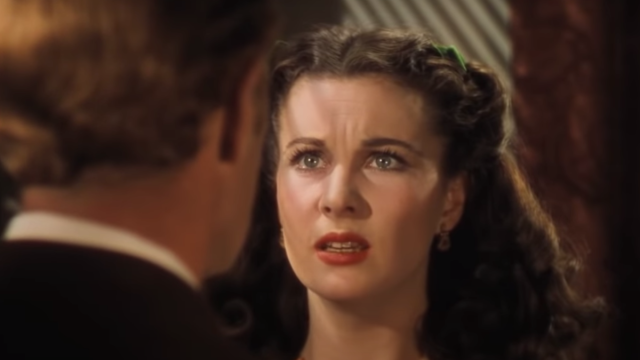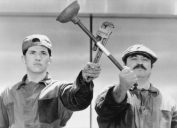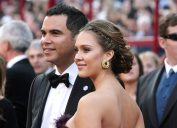6 Blockbuster Movies That Are Offensive by Today's Standards
From a Star Wars sequel to a Best Picture winner, these films have been reevaluated.

Movies are products of their time, and even the ones that were huge box office hits have the potential to be reevaluated culturally in the years after their release. Looking back at film history, there are many blockbusters that are considered offensive today, either for their overall storylines or for particular jokes or moments.
With time, audiences and filmmakers alike have become more aware of why certain stereotypes shouldn't be used or why certain jokes should not be made at the expense of entire groups of people. And while some of the movies listed here were already somewhat controversial at the time they came out, they've only become more so as viewers have become more educated.
Read on to find out about six blockbusters—in this case, movies that made over $100 million at the box office—that are offensive by today's standards and would probably be made differently if they came out in 2023.
READ THIS NEXT: 6 '90s Movies That Would Never Be Made Today.
1
Gone with the Wind
Gone with the Wind was a huge hit when it was released in 1939. When you adjust for inflation, it's still the highest-grossing movie of all time. (It made around $4 billion in today's money.)
But while Gone with the Wind is widely considered a classic, it's been reevaluated since its release. Today, it's perceived to glorify slavery and the antebellum south, and it has also been accused of promoting stereotypes of Black Americans.
In 2020, HBO Max made headlines for removing the movie from the platform but soon after it was reintroduced with a disclaimer segment that plays prior. As reported by Variety, the disclaimer notes that the film "denies the horrors of slavery, as well as its legacies of racial inequality." The message also explains that Black audiences were already concerned about the influence of the movie at the time of its release.
2
Ace Ventura: Pet Detective
The 1994 comedy Ace Ventura: Pet Detective made a star out of Jim Carrey, who plays a detective who specializes in animal-related mysteries. The movie made over $100 million at the box office and launched a franchise, which includes the 1995 sequel Ace Ventura: When Nature Calls.
In recent years, certain scenes and storylines have been called out as being transphobic and homophobic. For example, when Ace Ventura realizes that a character is transgender, he begins throwing up and exaggeratedly brushing his teeth, because he had kissed that person. There is also a scene in which he attempts to out the character for not being a "real woman," including trying to pull a wig off of her head and forcibly ripping off her clothing to expose her private parts, which causes everyone who sees this to vomit.
Carrey later claimed that the character was meant to be seen as homophobic. "It would probably be much different today," Carrey said at the Television Critics Association in 2019, as reported by Showbiz Cheat Sheet. "That was an honest completely homophobic reaction from that character. It was basically making fun of homophobia. It's ridiculous. I've got a plunger on my face because I kissed a dude. It's ridiculous."
3
Star Wars: Episode I — The Phantom Menace
Audiences were thrilled when Star Wars returned to the big screen in 1999 with the prequel The Phantom Menace, and the film subsequently raked in $1 billion.
One character who did not go over well with fans was Jar Jar Binks. And as time went by, the discussion became less about the GCI Gungan being annoying and more about the perception that he promoted Jamaican stereotypes. Some even compared Jar Jar's speech patterns and other characteristics as something you might have seen in a minstrel show.
Ahmed Best, the actor who played him, has defended the character. "I was shocked with the racial implications, but always knew they had little to no merit," he told Wired in a 2017 interview.
But the criticism of Phantom Menace doesn't stop there. Another character, Watto, has been accused of promoting Jewish stereotypes, while characters called Neimoidians are seen by some as furthering East Asian stereotypes.
For more celebrity news delivered right to your inbox, sign up for our daily newsletter.
4
The Help
The Help, based on the bestselling 2009 novel, is set in the early 1960s and follows a white woman (Emma Stone) who is an aspiring journalist and decides to write a story from the point of view of two Black maids. Though that character's intention is to center Black women, many have found that the 2011 movie focuses too much on its white characters.
Viola Davis, who played housekeeper Aibileen Clark, agreed with this criticism.
"Have I ever done roles that I've regretted? I have, and The Help is on that list," Davis told The New York Times in 2018. "I just felt that at the end of the day that it wasn't the voices of the maids that were heard. I know Aibileen. I know Minny. They're my grandma. They're my mom. And I know that if you do a movie where the whole premise is, I want to know what it feels like to work for white people and to bring children up in 1983, I want to hear how you really feel about it. I never heard that in the course of the movie."
5
Indiana Jones and the Temple of Doom
The second Indiana Jones movie, Indiana Jones and the Temple of Doom, has been criticized for its portrayal of Indian characters, along with other concerns.
The 1984 movie was banned in India at the time of its release. Among its offenses is a scene in which the movie's antagonist, Mola Ram (Amrish Puri) serves Jones and his cohorts spiders, snakes, and monkey-brain soup. There are also inaccurate and offensive depictions of Hinduism, particularly through Mola Ram's worship of the goddess Kali and the character's human sacrifices and other rituals.
The movie has also been described as a "white savior" story, as Jones is the one to rescue captured Indian people. On top of that, the depiction of Chinese character Short Round has also been called out as racist.
Ke Huy Quan, who played Short Round, weighed in speaking to The Guardian in 2022. "We're talking about something that was done almost 40 years ago," he said. "It was a different time. It's so hard to judge something so many years later. I have nothing but fond memories." He added that "Short Round is funny, he's courageous, he saves Indy's [expletive]" and that the character provided a rare instance of Asian representation in a Hollywood movie.
6
Slumdog Millionaire
Slumdog Millionaire was a box office hit, won eight Academy Awards (including Best Picture), and made stars of leads Dev Patel and Freida Pinto. The movie was already controversial in India and with some Indian viewers in other countries at the time of its release in 2008.
Some critiques of the movie have to do with its depiction of India and its inaccuracies, especially because it was directed by a white British director and written by a white British screenwriter. It's been referred to as "poverty porn" and received as a Western view of India, rather than an accurate one.
In 2009, the Los Angeles Times wrote, "Even as American audiences gush over Slumdog Millionaire, some Indians are groaning over what they see as yet another stereotypical foreign depiction of their nation, accentuating squalor, corruption and impoverished-if-resilient natives."
Shyamal Sengupta, a Mumbai film professor, told the publication, "It's a white man's imagined India. It's not quite snake charmers, but it's close. It's a poverty tour."





















